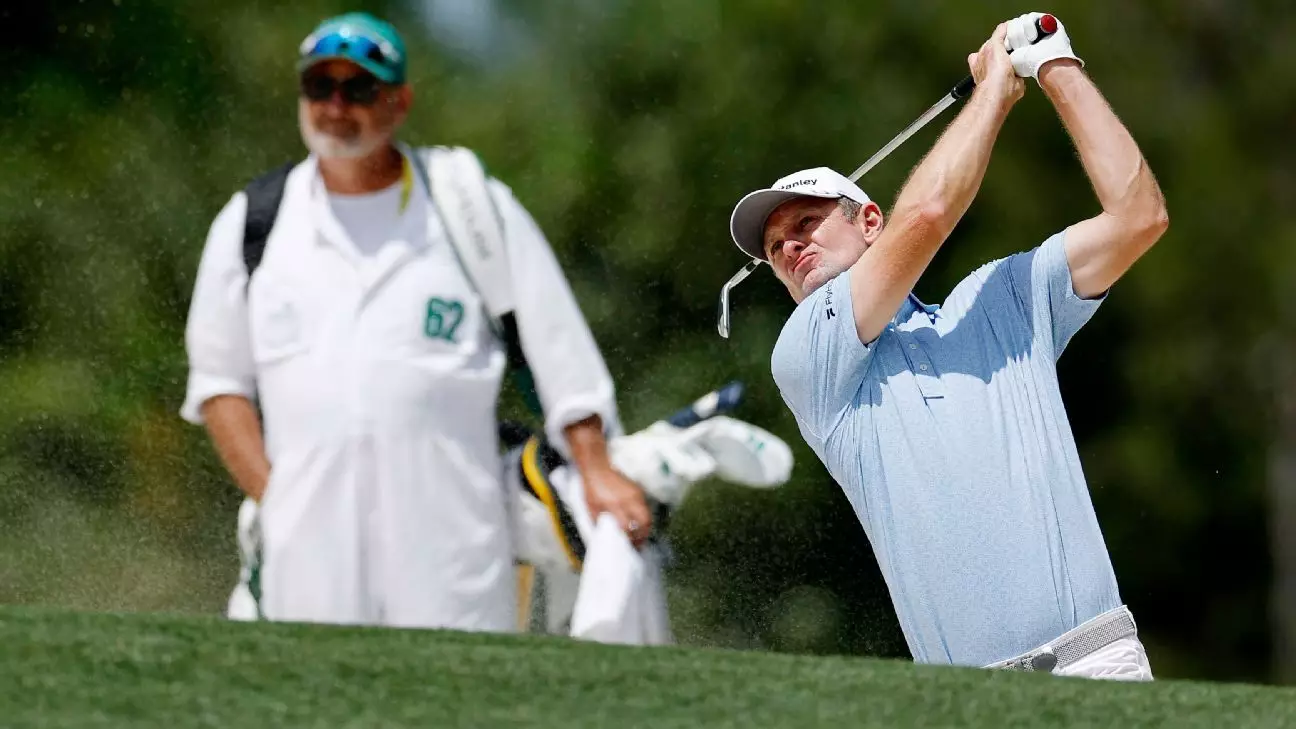In the illustrious arena of the Masters, traditionally dominated by the likes of Scottie Scheffler and Rory McIlroy, Justin Rose emerged as a refreshing disruptor. His spectacular performance, culminating in a remarkable 7-under 65, not only captivated the audience but also shattered the assumed narrative that overshadowed him. Rose’s stellar round, showcasing a blend of sharp skills and unwavering determination, elevated him to a three-shot lead, igniting hope and admiration from fans and commentators alike. As the sun set behind Augusta National, it was Rose’s name that resonated louder than those of his reigning adversaries.
For a player of Rose’s caliber, aged 44, the urgency of seizing opportunities on the golf course has never felt more pressing. His candid remark about the waning years of competitive golf reflects a broader reality experienced by many athletes: time is not always a friend. The stark contrast to legends like Jack Nicklaus—a player who understood how to convert openings into historic victories—highlights that time can often be both an adversary and an ally, depending on how one chooses to wield it.
The Ghosts of Championships Past
While Rose celebrated his achievements, a shadow loomed over McIlroy, a man whose burning desire to claim the elusive career Grand Slam continually morphs into an almost tragic narrative. After yielding to the pressures of the tournament, McIlroy’s double bogeys late in the afternoon—presents of carelessness that haunt even the best—confirmed his ongoing struggle at Augusta. Seven consecutive outings without breaking 70 in the opening round is more than just a statistic; it symbolizes a psychological weight that seems to increasingly envelop him. In sports, pressure can cultivate genius or crumble the best of intentions, and McIlroy finds himself in a stifling grip of the latter.
Such is the nature of professional sports where the past can interfere with the present. The ghosts of missed opportunities tend to cast shadows over the minds of even the most accomplished players. Conversely, for Rose, the past rings both encouragingly and disappointingly loud—his narrow loss to Sergio Garcia in 2017 still fresh in his mind as a powerful motivator. The idea that one must continually perform to land on the leaderboard emphasizes that golf is as much a mental battle as it is a physical one.
Varying Experiences Among Competitors
The Masters isn’t merely about the giants of the game. The subtle interplay of rising stars and underdogs adds layers to this dramatic narrative. Consider Canadian Corey Conners and newcomer Ludvig Åberg—both crafting their stories uniquely—sharing the spotlight with the traditional powerhouses. Conners’ late-game resilience, fueled by birdies from the final two holes, and Åberg’s growing confidence showcase that talent can and does emerge from unexpected corners. However, this tournament is not without its horror stories—like 21-year-old Nick Dunlap’s dismal 90, which evokes an eerie reminder of how quickly fortunes can shift in this game.
The dichotomy of success and failure is strikingly vivid in golf, where a single round can encapsulate the zenith of triumph or the depths of despair. Players like Bryson DeChambeau, who embraced the ups and downs with liberating candor, remind us that in the chaos of golf, resilience matters. “Making some bogeys probably frees me up a little bit,” he reflected—an acknowledgment that often, the best performances come after navigating adversity. It’s a mantra that beckons every golfer to embrace imperfections as stepping stones rather than roadblocks.
The Weight of Expectations
Expectations at the Masters are an immense force, both ushering triumph and breeding anxiety. Rose’s performance was a delightful declaration that on any given day, the game belongs to those who refuse to falter under pressure. His historically outstanding round propelled him into a narrative laden with both anticipation and apprehension; can he maintain this momentum? Can he convert his long-standing performance into a long-coveted green jacket?
Meanwhile, as hallowed names like Fred Couples etch new chapters into their storied legacies, that same desire stirs a hopeful tension within Rose. He bears the burden of legacy and expectation—one that is becoming ever-more tangible with each passing tournament. The playful yet resolute spirit he exuded suggests he understands this fine line: tomorrow may be uncertain, but today’s performance deserves celebration.
Through the lens of a tournament that has soared to legendary heights, we see how golf is more than a game; it’s an unfolding drama—vastly human, eternally unpredictable, and achingly beautiful. As the Masters progresses, it will be compelling to witness how narratives intertwine and evolve. The promise of a new champion lingers, yet the echoes of the past remain ever-present.


Leave a Reply